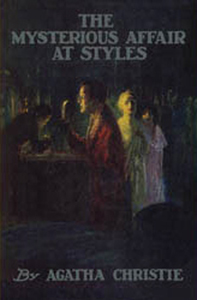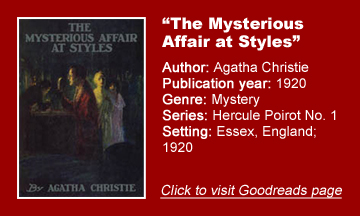Hercule Poirot is in vintage form right out of the gate in “The Mysterious Affair at Styles” (1920), Agatha Christie’s first novel (which – trivia time — was actually published in the U.S. three months before England). The book includes all the endearing affectations of the small, methodical, sometimes ebullient Belgian, and Christie’s go-to storytelling traits.
Poirot and Hastings
The story is narrated by Poirot’s friend Hastings, who is – much to a reader’s amusement – unaware when the superior detective shows greater smarts. Christie successfully walks a fine line wherein Hastings isn’t too much of a joke or a punching bag – he is the reader surrogate, after all.
Partly this is because Poirot’s tosses off the insults when wrapped up in deeper thoughts, but mainly we forgive him because it’s so funny.
For example, in chapter 8, Poirot expresses that he and Hastings must be smarter than the murderer: “We must be so intelligent that he does not suspect us of being intelligent at all. … There, mon ami, you will be of great assistance to me.”
Hastings thinks: “I was pleased with the compliment. There had been times when I hardly thought that Poirot appreciated me at my true worth.”
It’s fun to have Hastings assuming – like everyone else – that Mr. Inglethorp is the killer of Mrs. Inglethorp for the sake of inheriting her fortune while Poirot is looking deeper, knowing the net is too conveniently tight around the suspect.
Whereas Hastings (and unwary readers) develop theories first and discard facts that don’t fit, Poirot compiles the facts and comes up with theories later. What Hastings thinks are unimportant facts Poirot embraces as crucial facts.
Not exactly past his prime
Christie is creating an icon with Poirot, but I wonder if she is doing it consciously, as this first yarn finds Poirot past his (supposed) glory years with the police in Belgium.
We hear brief accounts of his successes back in 1904, and it’s alluded that Poirot is retired from detective work, at least in an official capacity. On the other hand, there’s something to be said for reading about someone who is at the top of their game despite being middle-aged or older.
The concept of a murder taking place at a distinct English estate will be a go-to for many future novels, and “Styles” is a strong debut example – a large house peppered with what seems at first to be too many characters. But a reader gets used to it because Christie is good at giving them personalities.
Hastings particularly has eyes for Mrs. Mary Cavendish, the daughter-in-law of Mrs. Inglethorp, and Cynthia, the victim’s nurse. One of the pleasures of reading a book contemporary to 1920 is that it’s now a perfectly preserved historical artifact, so we learn about old customs.
In a social situation where today Hastings would ask Cynthia out on a date, 100 years ago he asks her to marry him. (Christie also uses the n-word in passing at one point; all we can do is cringe and move on.)

Legal steps, and Poirot’s process
“Styles” lays out the English legal steps, notably the inquest where everyone gathers to establish the known facts of the death. This novel also includes multiple court trials, which are not a given in Christie books.
But then we get the classic finale of Poirot gathering everyone together in a room to lay out his theory — which is, of course, correct, because he doesn’t unveil his beliefs until he is certain, or as close to certain as he can be.
“The Mysterious Affair at Styles” is a page-turner: A reader just has to know what Poirot knows. It’s not merely a desire to know whodunit, but more to know the hows and whys. We’re always breathlessly trying to catch up with him – similar to Hastings, except that we know Poirot knows what he is doing.
Although, come to think of it, maybe readers in 1920 didn’t know that yet. But they will in many future mysteries.
Every week, Sleuthing Sunday reviews an Agatha Christie book or adaptation. Click here to visit our Agatha Christie Zone.


